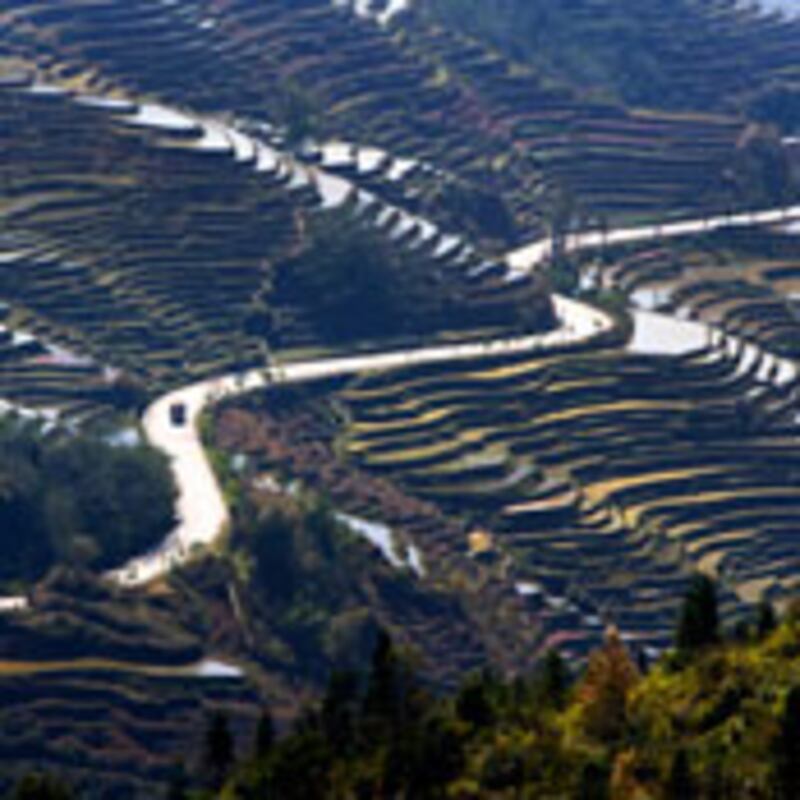
In 2002, Peter Hessler began to look for a home in the Chinese countryside. He had lived in Beijing for a little over a year and was having difficulty writing in the city. It wasn’t simply the noise and congestion. Beijing had 13 million people, but he felt disconnected, as though his finger were off the pulse of things. He found it difficult to interact with the cosmopolitan and educated Beijingese; he missed the camaraderie he had developed with his students in Fuling, the Sichuanese city where he had taught English as a Peace Corps volunteer for two years starting in 1996 (an experience he recounts in his first memoir, River Town).
“In China, I was always drawn to these people that were in transition,” Hessler says, “people moving from countryside to city, from uneducated to some form of education or awareness of the world. I think it’s the most important group in China to understand in this period.”
“It wasn't a calculated writing decision to search for a country home,” Hessler says, “but it was a very calculated personal decision. I need a place I'll feel connected to.” He settled on Sancha, a town with fewer than 150 people and a view of the Great Wall. “In the past,” Hessler writes in his new book Country Driving, “a glimpse of the Great Wall had always made me think about traveling, but when I saw it from Sancha, I said to myself: This is where I’ll stay.”
Country Driving follows the path of modern China’s migrants, from countryside to city. About 150 million Chinese people live away from the rural villages in which they are registered, and hundreds of millions more are expected to follow in their footsteps as part of the largest migration in the history of the world. Hessler looks at how automobiles are fueling this massive movement of people. In 2003, for example, China’s passenger-car sales grew 80 percent, and the government began paving 119,000 miles of country road.
The book opens with Hessler’s road trips through the ghost towns that buffer the Great Wall, their residents having set off for opportunity in the south. Hessler covers more than 7,000 miles before narrowing in on Sancha. The town is practically abandoned when Hessler arrives, but it turns out that Hessler, with his rented car, is a forerunner of China’s automobile boom. By the time he leaves Sancha, the town is thriving with restaurants and hotels for weekenders from Beijing. Country Driving then moves to the southern boomtown of Lishui, where Hessler writes about a bra-ring factory.
The jacket copy bills Country Driving as the third book in a trilogy, and Hessler says that his three books comprise a set. “This a coherent period,” he says. “It’s a very distinctive period in China in that you did not have a lot of political change, but what you had is this incredible energy from average people. Especially, migrants from the countryside.”

The “incredible energy” Hessler refers to will be familiar to readers of River Town and Hessler’s second book, Oracle Bones. His students from Fuling, who feature prominently in both books, practically radiate it. Fans of Hessler’s earlier work might be saddened to learn that Hessler’s students do not return in his latest. “There wasn't any conscious decision to leave them out,” Hessler says, and he adds that they figure in “indirectly,” working behind the narrative to help him with things like renting cars and arranging interviews.
This time, Hessler focuses his story on families like the Weis, his landlords in Sancha, and the Taos, who work in the bra-ring factory in Lishui. The Weis are an upwardly mobile rural family, and Hessler sees them through their son Jia’s battle with a mysterious autoimmune ailment and the father Ziqi’s challenge to the local Communist Party leader. The Taos, meanwhile, are a plucky migrant family that finds work—even for their underage 15-year-old daughter—in the bra-ring factory.
“In China, I was always drawn to these people that were in transition,” Hessler says, “people moving from countryside to city, from uneducated to some form of education or awareness of the world. I think it’s the most important group in China to understand in this period.”
Even Hessler says it’s “striking” how few really educated people he writes about, and in Country Driving the Chinese government is more comical than it is monolithic—attempting to control traffic by putting statues of policemen along the roads or painting slogans on towers in abandoned places. Lishui is more a Wild West than it is a police state; in two years, Hessler never had an official interview with a high-ranking official.
Today, Hessler lives in Ridgeway, Colorado—a town of about 700 that invited Joe the Plumber to a recent parade. “After I moved back the United States, when we started buying things, I kept track of what came from China, which is pretty much everything,” he says. “I don’t feel the guilt that a lot of people do. I think there's often this sense that, as a consumer, that you really need to feel sorry for the Chinese factory worker. I’m really impressed by those people and their resourcefulness. If you look at the Tao family, those people had a lot of agency but basically they didn't have the kind of agency that we tend to respect and expect—union cards or access to a free press, and there weren’t people helping them. But they found a way to get things done, and they were resourceful and they were tough. I didn’t feel sorry for them and I think they will get easier. I have faith in those people making good decisions for themselves. Eventually, this kind of person reaches a point where the system changes.”
Hessler has not been to China since the Beijing Olympics. When he is ready to leave Ridgeway, he and his wife will look not back to China, but rather to the Middle East. “I think we're going to probably move to the Middle East and live there for a few years. We want to learn another language, I like the idea of a place that has a rich history and a rich language and I like the challenge. I want to go to a place that’s quite different so I can see it on its own terms.”
But eventually, he plans on returning to China, and already he knows where he’ll go. “I just rebuilt the house in Sancha. We both decided that we'll probably be living in China again at some point, and we wanted something in that community and the house was falling apart.”
Plus: Check out Book Beast, for more news on hot titles and authors and excerpts from the latest books.
Ben Crair is an associate editor at The Daily Beast.






